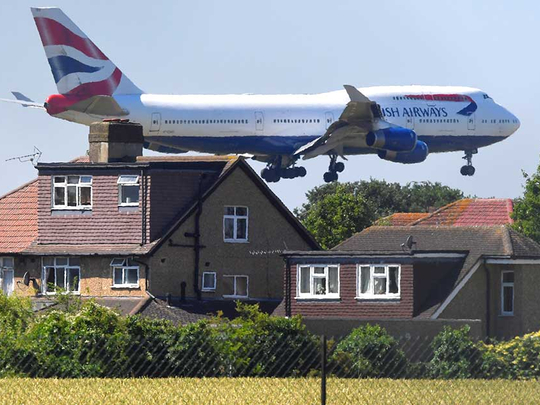IATA is opposed to social distancing onboard flights

A British Airways Boeing 747 comes in to land at Heathrow aiport in London. The international aviation governing body on Tuesday said it is opposed to social distancing during flights, claiming that “evidence” suggests that the risk of transmission on board aircraft is low, and warned that airfare will have to go up by more than 50 percent to cover the cost when air travel resumes.
Image Credit: Reuters
Dubai: The international aviation governing body on Tuesday said it is opposed to social distancing during flights, claiming that “evidence” suggests that the risk of transmission on board aircraft is low, and warned that airfare will have to go up by more than 50 percent to cover the cost when air travel resumes.
The International Air Transport Association (IATA) said in a statement emailed to Gulf News that it supports the wearing of face coverings for passengers and masks for crew while on board aircraft “as a critical part of a layered approach to biosecurity to be implemented temporarily when people return to traveling by air.” But the agency does not support mandating social distancing measures that would leave ‘middle seats’ empty, the statement stressed.
Calls for social distancing measures on aircraft would “fundamentally shift the economics of aviation by slashing the maximum load factor to 62 percent, which is well below the average industry breakeven load factor of 77 percent,” IATA said, warning if serious economic impact if social distancing becomes mandatory onboard flights.
Global airlines have lost billions of dollars since the start of the coronavirus pandemic as most countries restricted air travels and closed borders to contain the spread of COVID-19.
With fewer seats to sell, unit costs would rise sharply, IATA said. “Compared to 2019, air fares would need to go up dramatically—between 43 percent and 54 percent depending on the region—just to cover costs,” the agency warned.
IATA cited examples of recent flights between China and Canada and China and the United States as “evidence” to argue against social distancing. “The evidence suggests that the risk of transmission on board aircraft is low. Mask-wearing by passengers and crew will reduce the already low risk, while avoiding the dramatic cost increases to air travel that onboard social distancing measures would bring,” it explained in the statement.
The agency said even if mandated, “keeping the ‘middle seat’ open will not achieve the recommended separation for social distancing to be effective.” Most authorities recommend 1m-2m while the average seat width is less than 50 cm.
“The safety of passengers and crew is paramount. The aviation industry is working with governments to re-start flying when this can be done safely. And we will take measures—such as the wearing of face coverings by passengers and masks by crew—to add extra layers of protection. We must arrive at a solution that gives passengers the confidence to fly and keeps the cost of flying affordable. One without the other will have no lasting benefit,” Alexandre de Juniac, IATA’s Director General and CEO said.
IATA RECOMMENDATIONS
The agency recommended several measures to reduce the risk of onboard transmission in addition to mandatory face-coverings for passengers and masks for crew:
• Temperature screening of passengers, airport workers and travelers,
• Boarding and deplaning processes that reduce contact with other passengers or crew,
• Limiting movement within the cabin during flight,
• More frequent and deeper cabin cleaning; and
• Simplified catering procedures that lower crew movement and interaction with passengers

Comments